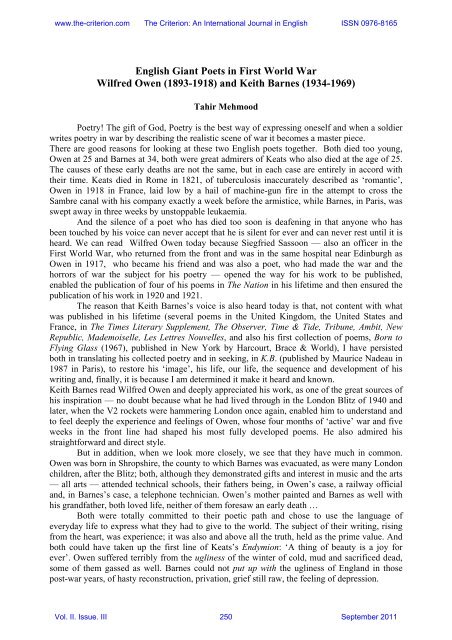Vol. II. Issue. III September 2011 - The Criterion: An International ...
Vol. II. Issue. III September 2011 - The Criterion: An International ...
Vol. II. Issue. III September 2011 - The Criterion: An International ...
Create successful ePaper yourself
Turn your PDF publications into a flip-book with our unique Google optimized e-Paper software.
www.the-criterion.com <strong>The</strong> <strong>Criterion</strong>: <strong>An</strong> <strong>International</strong> Journal in English ISSN 0976-8165<br />
English Giant Poets in First World War<br />
Wilfred Owen (1893-1918) and Keith Barnes (1934-1969)<br />
Tahir Mehmood<br />
Poetry! <strong>The</strong> gift of God, Poetry is the best way of expressing oneself and when a soldier<br />
writes poetry in war by describing the realistic scene of war it becomes a master piece.<br />
<strong>The</strong>re are good reasons for looking at these two English poets together. Both died too young,<br />
Owen at 25 and Barnes at 34, both were great admirers of Keats who also died at the age of 25.<br />
<strong>The</strong> causes of these early deaths are not the same, but in each case are entirely in accord with<br />
their time. Keats died in Rome in 1821, of tuberculosis inaccurately described as ‘romantic’,<br />
Owen in 1918 in France, laid low by a hail of machine-gun fire in the attempt to cross the<br />
Sambre canal with his company exactly a week before the armistice, while Barnes, in Paris, was<br />
swept away in three weeks by unstoppable leukaemia.<br />
<strong>An</strong>d the silence of a poet who has died too soon is deafening in that anyone who has<br />
been touched by his voice can never accept that he is silent for ever and can never rest until it is<br />
heard. We can read Wilfred Owen today because Siegfried Sassoon — also an officer in the<br />
First World War, who returned from the front and was in the same hospital near Edinburgh as<br />
Owen in 1917, who became his friend and was also a poet, who had made the war and the<br />
horrors of war the subject for his poetry — opened the way for his work to be published,<br />
enabled the publication of four of his poems in <strong>The</strong> Nation in his lifetime and then ensured the<br />
publication of his work in 1920 and 1921.<br />
<strong>The</strong> reason that Keith Barnes’s voice is also heard today is that, not content with what<br />
was published in his lifetime (several poems in the United Kingdom, the United States and<br />
France, in <strong>The</strong> Times Literary Supplement, <strong>The</strong> Observer, Time & Tide, Tribune, Ambit, New<br />
Republic, Mademoiselle, Les Lettres Nouvelles, and also his first collection of poems, Born to<br />
Flying Glass (1967), published in New York by Harcourt, Brace & World), I have persisted<br />
both in translating his collected poetry and in seeking, in K.B. (published by Maurice Nadeau in<br />
1987 in Paris), to restore his ‘image’, his life, our life, the sequence and development of his<br />
writing and, finally, it is because I am determined it make it heard and known.<br />
Keith Barnes read Wilfred Owen and deeply appreciated his work, as one of the great sources of<br />
his inspiration — no doubt because what he had lived through in the London Blitz of 1940 and<br />
later, when the V2 rockets were hammering London once again, enabled him to understand and<br />
to feel deeply the experience and feelings of Owen, whose four months of ‘active’ war and five<br />
weeks in the front line had shaped his most fully developed poems. He also admired his<br />
straightforward and direct style.<br />
But in addition, when we look more closely, we see that they have much in common.<br />
Owen was born in Shropshire, the county to which Barnes was evacuated, as were many London<br />
children, after the Blitz; both, although they demonstrated gifts and interest in music and the arts<br />
— all arts — attended technical schools, their fathers being, in Owen’s case, a railway official<br />
and, in Barnes’s case, a telephone technician. Owen’s mother painted and Barnes as well with<br />
his grandfather, both loved life, neither of them foresaw an early death …<br />
Both were totally committed to their poetic path and chose to use the language of<br />
everyday life to express what they had to give to the world. <strong>The</strong> subject of their writing, rising<br />
from the heart, was experience; it was also and above all the truth, held as the prime value. <strong>An</strong>d<br />
both could have taken up the first line of Keats’s Endymion: ‘A thing of beauty is a joy for<br />
ever’. Owen suffered terribly from the ugliness of the winter of cold, mud and sacrificed dead,<br />
some of them gassed as well. Barnes could not put up with the ugliness of England in those<br />
post-war years, of hasty reconstruction, privation, grief still raw, the feeling of depression.<br />
<strong>Vol</strong>. <strong>II</strong>. <strong>Issue</strong>. <strong>II</strong>I 250 <strong>September</strong> <strong>2011</strong>
















